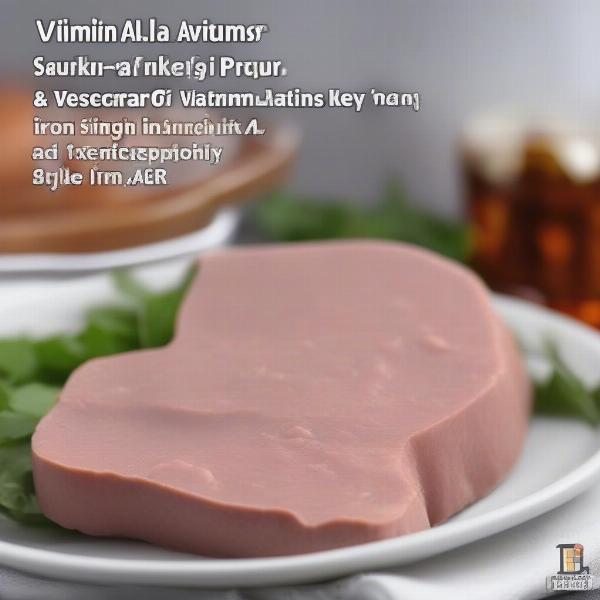Liverwurst, with its rich, meaty aroma, can be tempting to share with your canine companion. But is liverwurst good for dogs? The answer isn’t a simple yes or no. While liverwurst can offer some nutritional benefits, it’s crucial to understand the potential risks and how to feed it safely. This article will explore the pros and cons of giving liverwurst to your dog, helping you make informed decisions about their diet.
Liverwurst is packed with vitamins and minerals, particularly vitamin A, B vitamins, and iron. These nutrients are essential for a dog’s overall health, supporting healthy vision, nerve function, and red blood cell production. However, liverwurst is also high in fat and sodium, which can be detrimental to a dog’s health if consumed in large quantities. Too much vitamin A can also be toxic, leading to serious health problems. Therefore, moderation and careful consideration are key when it comes to feeding your dog liverwurst.
Understanding the Nutritional Value of Liverwurst for Dogs
Liverwurst, primarily made from liver, contains high levels of protein, which is crucial for muscle development and repair. It’s a good source of essential amino acids that contribute to a healthy coat and strong immune system. The high iron content in liverwurst can be beneficial for dogs with anemia or iron deficiency.
 Liverwurst Nutritional Value for Dogs
Liverwurst Nutritional Value for Dogs
Potential Benefits of Liverwurst for Dogs
- Boosting Energy Levels: The high calorie content of liverwurst can provide a quick energy boost, particularly helpful for active dogs or those recovering from illness.
- Improving Coat Health: The vitamin A and essential fatty acids in liverwurst contribute to a healthy, shiny coat.
- Supporting Cognitive Function: B vitamins are crucial for brain health and can help improve cognitive function in dogs.
Potential Risks of Feeding Liverwurst to Dogs
- High Fat Content: Excessive fat intake can lead to obesity, pancreatitis, and other health issues.
- High Sodium Content: Too much sodium can contribute to high blood pressure and other cardiovascular problems.
- Vitamin A Toxicity: While vitamin A is essential, excessive amounts can be toxic, leading to bone problems, liver damage, and birth defects.
- Garlic and Onion Toxicity: Some liverwurst varieties contain garlic or onion powder, both of which are toxic to dogs. Always check the ingredients list carefully.
How to Safely Feed Liverwurst to Your Dog
If you decide to give your dog liverwurst, do so sparingly. A small amount, occasionally, can be a tasty treat. Avoid giving liverwurst as a regular part of their diet.
Tips for Safe Liverwurst Consumption
- Choose low-sodium varieties: Opt for liverwurst with reduced sodium content to minimize the risk of health problems.
- Check for harmful ingredients: Ensure the liverwurst doesn’t contain garlic, onion, or other toxic ingredients.
- Introduce gradually: Start with a very small amount and monitor your dog for any adverse reactions.
- Consult your veterinarian: Before adding any new food to your dog’s diet, it’s always best to consult with your veterinarian. They can advise you on the appropriate serving size and frequency based on your dog’s individual needs.
Can Puppies Eat Liverwurst?
Puppies have different nutritional needs than adult dogs. While a tiny taste of liverwurst might not harm them, it’s generally best to avoid feeding it to puppies due to the high fat and vitamin A content.
Conclusion
Liverwurst can be a tasty and nutritious treat for dogs in moderation. However, due to its high fat, sodium, and vitamin A content, it’s crucial to feed it sparingly and choose varieties that are low in sodium and free of harmful ingredients. Always consult your veterinarian before adding liverwurst or any new food to your dog’s diet. By following these guidelines, you can ensure your furry friend enjoys the occasional taste of liverwurst without compromising their health.
FAQ
- Can I give my dog liverwurst every day? No, liverwurst should not be given daily due to its high fat and vitamin A content.
- What are the signs of vitamin A toxicity in dogs? Signs include loss of appetite, lethargy, bone pain, and joint stiffness.
- Is liverwurst a good source of protein for dogs? Yes, liverwurst is a good source of protein, but other healthier protein sources are available.
- Can I use liverwurst as a training treat? While you can use it occasionally, it’s best to opt for healthier, lower-calorie training treats.
- What should I do if my dog eats too much liverwurst? Contact your veterinarian immediately.
- Are there any dog breeds that shouldn’t eat liverwurst? Dogs with pancreatitis or liver conditions should avoid liverwurst.
- Can senior dogs eat liverwurst? Senior dogs can eat liverwurst in very small amounts, but consult your vet first.
Related Articles
ILM Dog is your trusted resource for all things dog-related. We offer expert advice on dog breeds, health, training, nutrition, grooming, and much more. Whether you’re a new dog owner or a seasoned pro, our goal is to provide you with the information you need to give your furry friend the best possible care. As experts in canine nutrition, we can help you understand the best diet for your dog. From choosing the right food to addressing specific dietary needs, we’re here to help. Contact us today for personalized guidance and support. Email: [email protected], Phone: +44 20-3965-8624. Visit ILM Dog for more information.